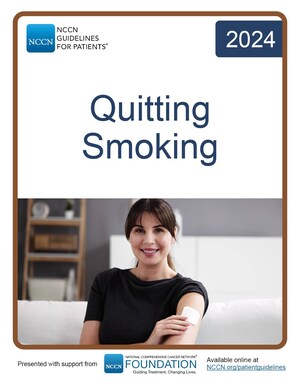NCCN Publishes New Guide to Improving Knowledge and Quality of Life for Small Cell Lung Cancer Patients
New patient and caregiver resource from the National Comprehensive Cancer Network provides free expert consensus information on improving outcomes for people with an aggressive type of lung cancer.
PLYMOUTH MEETING, Pa., Sept. 30, 2021 /PRNewswire/ -- The National Comprehensive Cancer Network® (NCCN®) today announced the publication of new NCCN Guidelines for Patients®: Small Cell Lung Cancer (SCLC), which is a neuroendocrine tumor type of lung cancer that is linked to smoking and tends to be aggressive. However, it is important to understand management options and ways to mitigate symptoms of the cancer and/or therapy. This guide is intended to empower patients and caregivers with the same expert treatment information as their doctors. It is free to view or download at NCCN.org/patientguidelines and is funded by NCCN Foundation®.
"When you first learn of your or your loved one's lung cancer diagnosis, it can be a shock," said Deb Violette, President, Free ME From Lung Cancer. "It's hard to know what information is important or even what questions to ask. These patient guidelines from NCCN give us the scientifically accurate and valid information we need before we try to navigate what's out there on the internet or hear things from friends. People can look through this book on their own time and learn more about what to expect from their treatment course."
The NCCN Guidelines for Patients: SCLC are based on the latest evidence and expert-consensus from the gold standard NCCN Clinical Practice Guidelines in Oncology (NCCN Guidelines®) intended for health care professionals. The NCCN Guidelines® for Small Cell Lung Cancer are developed by a multidisciplinary panel of experts from across the leading cancer centers that comprise NCCN Member Institutions. These expert recommendations are presented in non-medical terms for the patient version, which also include a glossary, illustrations, suggested questions to ask doctors, and space for notes.
"People with SCLC often experience rapid deterioration but also equally rapid response to treatment," explained Apar Kishor P. Ganti, MD, Fred & Pamela Buffett Cancer Center, Chair of the NCCN Guidelines Panel for Small Cell Lung Cancer. "I remember my very first patient entering the hospital in a wheelchair. After his first cycle of chemotherapy he was able to walk out and have a much better quality of life, and even celebrate an important milestone. This disease is very aggressive and can be a bit of a rollercoaster. I'm grateful to now have this new resource from NCCN to help patients and their loved ones gain a clearer understanding of what to expect."
Dr. Ganti continued: "The introduction of immunotherapy as part of first-line treatment for patients with widespread disease has been a big step forward. More trials are underway and we're hoping to know more about the role of immunotherapy for localized SCLC in the next few years."
NCCN's clinical and patient guidelines for SCLC stress the importance of encouraging patients to quit smoking if at all possible. People who smoke are much more likely to get SCLC and people who continue smoking through treatment generally have poorer outcomes. NCCN also publishes clinical practice guidelines for smoking cessation to inform health care providers regarding best practices and tailored approaches to help people avoid or overcome this dangerous habit.
There are now more than 55 different NCCN Guidelines for Patients covering every major type of cancer, along with topics like managing cancer-related distress, nausea and vomiting, and survivorship, plus special considerations for adolescents and young adults across all cancer types. Free digital versions are available at NCCN.org/patientguidelines and via the NCCN Patient Guides for Cancer app. Printed versions are available for a nominal fee at Amazon.com.
About the National Comprehensive Cancer Network
The National Comprehensive Cancer Network® (NCCN®) is a not-for-profit alliance of leading cancer centers devoted to patient care, research, and education. NCCN is dedicated to improving and facilitating quality, effective, efficient, and accessible cancer care so patients can live better lives. The NCCN Clinical Practice Guidelines in Oncology (NCCN Guidelines®) provide transparent, evidence-based, expert consensus recommendations for cancer treatment, prevention, and supportive services; they are the recognized standard for clinical direction and policy in cancer management and the most thorough and frequently-updated clinical practice guidelines available in any area of medicine. The NCCN Guidelines for Patients® provide expert cancer treatment information to inform and empower patients and caregivers, through support from the NCCN Foundation®. NCCN also advances continuing education, global initiatives, policy, and research collaboration and publication in oncology. Visit NCCN.org for more information and follow NCCN on Facebook @NCCNorg, Instagram @NCCNorg, and Twitter @NCCN.
About the NCCN Foundation
The NCCN Foundation® was founded by the National Comprehensive Cancer Network® (NCCN®) to empower people with cancer and advance oncology innovation. The NCCN Foundation empowers people with cancer and their caregivers by delivering unbiased expert guidance from the world's leading cancer experts through the library of NCCN Guidelines for Patients® and other patient education resources. The NCCN Foundation is also committed to advancing cancer treatment by funding the nation's promising young investigators at the forefront of cancer research. For more information about the NCCN Foundation, visit NCCN.org/patients.
Media Contact:
Rachel Darwin
267-622-6624
[email protected]
Photo - https://mma.prnewswire.com/media/1638169/NCCN_Guidelines_for_Patients___Small_Cell_Lung_Cancer.jpg
Logo - https://mma.prnewswire.com/media/441768/NCCN_Logo.jpg







Share this article